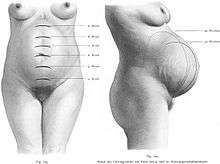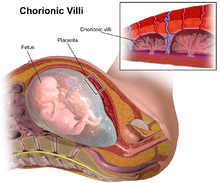Pregnancy, also known as gestation, is the time during which one or more offspring develops inside a woman.
Quotes

Pregnancy seemed like a tremendous abdication of control. Something growing inside you which would eventually usurp your life. ~ Erica Jong
At some point in the process from conception to birth there comes “a period when a life contains that which is essentially valued as significantly human and should be vested with a sanctity uncompromisable to the interest of lesser claims. ~ Robert M. Veatch

There's an entire generation of women who saw a sonogram as their first baby picture. ~ Charmaine Yoest
- Eric Johnston, an attorney who helped draft the Alabama bill, thinks a man and a woman can have sex and go straight to a clinic to determine if she’s pregnant. First off, you’ve gotta give her six minutes to clench her way to a toilet; otherwise she’s gonna get a UTI and ruin an exam table. Secondly, that isn’t how it works. . . It's still hard to know if you're pregnant at six weeks. You might have no symptoms, or if you do, they’re symptoms like fatigue or bloating and gas. On the other hand, it does explain P.F. Chang’s new motto: ‘Maybe it’s not us; maybe you’re pregnant!’
- Samantha Bee, Full Frontal with Samantha Bee, (5/15/2019); as qtd. in Laura Bradley, "Samantha Bee Teaches “F--king Idiots” Behind Abortion Laws Some Sex Ed", Vanity Fair, (May 16, 2019).
- The bearing of a child takes nine months, no matter how many women are assigned.
- Fred Brooks, The Mythical Man-Month: Essays on Software Engineering (1975, 1995) Page 17, cf. Theodore von Kármán (1957): "Everyone knows it takes a woman nine months to have a baby. But you Americans think if you get nine women pregnant, you can have a baby in a month."
- Techniques that entail the dissociation of husband and wife, by the intrusion of a person other than the couple (donation of sperm or ovum, surrogate uterus), are gravely immoral.
- "Paragraph 2376". Catechism of the Catholic Church.
- Techniques involving only the married couple (homologous artificial insemination and fertilization) are perhaps less reprehensible, yet remain morally unacceptable. They dissociate the sexual act from the procreative act. The act which brings the child into existence is no longer an act by which two persons give themselves to one another, but one that "entrusts the life and identity of the embryo into the power of doctors and biologists and establishes the domination of technology over the origin and destiny of the human person. Such a relationship of domination is in itself contrary to the dignity and equality that must be common to parents and children."
- "Catechism of the Catholic Church. Section 2377". Rome: Vatican. 1993. Retrieved 25 November 2008.
- “There's an entire generation of women who saw a sonogram as their first baby picture," Charmaine Yoest, the president of Americans United for Life, told the AP. This seems like a thin argument—real-time ultrasound machines have been available since at least the mid-1970s, and it seems doubtful that women’s views would be radically reshaped by the sonograms that theoretically bedecked the mantelpieces of their childhood homes.
- Emma Green, Are Fewer American Women Getting Abortions?”, The Atlantic, (June 17, 2015).
- Pregnancy seemed like a tremendous abdication of control. Something growing inside you which would eventually usurp your life.
- Erica Jong, Fear of Flying, (1973).
- A Padmini procreates once in four years, Chitarini once in three, Hastini once in two and Sankhini every year.
- Labdhodaya in his Padmini Charitra Choupai. quoted from B.K. Karkra, Rani Padmini, The Heroine of Chittor. (2009) Rupa.
- Robert Winston, a pioneer of in-vitro fertilization, created a stir in 1999 when he told London's Sunday Times that "male pregnancy would certainly be possible." In rare cases, women have given birth to babies that developed outside the uterus--a phenomenon known as ectopic or extrauterine pregnancy. Winston argued that men should also be able to bear fetuses in their abdominal cavities. But male pregnancy would be complicated and, scientists say, potentially fatal.
A doctor would first administer a battery of hormones, including estrogen and progesterone, to prepare the male body to support a developing fetus. Side effects of the hormones could include the development of breasts, sterility, even cancer. A surgeon would then implant an embryo, created by in-vitro fertilization, in the wall of the man's peritoneum, the membrane that lines the abdominal cavity. If all went well, the fetus would grow inside the abdomen until delivery by cesarean section.
The delivery would probably be the most dangerous part of this hypothetical process, because there would be a high risk of hemorrhaging. During pregnancy, the placenta extends villi, hairlike projections containing blood vessels, into the surrounding tissues to establish a blood supply for the baby. Unlike the uterus, the abdomen is not designed to separate from the placenta during delivery. The placenta would become so bonded to the man's body that it might be impossible to surgically remove it without also removing parts of abdominal organs, such as the bowels. The likely end product: a gaping wound in the abdomen and heavy, uncontrolled bleeding, says Gillian Lockwood, medical director of Midland Fertility Services, a leading British fertility clinic.
The alternative--leaving the placenta in place--could be even more dangerous. The placenta would shrink after the birth, thus possibly rupturing the blood vessels attached to it. There would also be a high risk of infection caused by the dead placental tissue. "The question is not 'Can a man do it?' " says bioethicist Glenn McGee of Albany Medical College. "It's 'If a man does have a successful pregnancy, can he survive it?'"- Meryl Rothstein, Holly Lindem; “Male Pregnancy: A Dangerous Proposition”, Popular Science, (August 1, 2005)
- Standing in the Hebrew-Christian tradition, we affirm God as the Source of life-our life, all life, life to the full. He has called us to share the work of creation with him giving us the privileges and responsibilities of fellowship in the family and in the wider units of society. Thus we affirm the freedom with which God endowed men and women, but we affirm and receive this as freedom bound to responsibility. At its best our Western legal tradition, too, has served the dual purpose of protecting human freedom and helping human beings to discharge their responsibilities to one another.
Our religious heritage has also stressed reverence for human life. Accordingly, the enhancement of human life and the protection of the rights of persons, particularly the weak and defenseless, has become an important element in our legal system. It has found expression in laws intended to protect those who cannot protect themselves, such as children, including the unborn. It is neither likely nor desirable that organized society would disavow its responsibility in this regard.
Inevitably, therefore, a judgment will be made or assumed as to when personal human life begins and at what point society has an interest in it and affirms an obligation toward it. Although a form of life exist in the sperm and the unfertilized ovum, new kind of life emerges at the moment of their union. Many regard conception (up to 72 hours after coitus), others implantation (7 days), as the beginning of an inviolable life. But while such life is human in origin and potentially human in character, the integration of bodily functions and the possibility of social interaction do not appear until later. Alternative candidates for the beginning of significantly human life are the final fixing of the genetic code (3 weeks), the first central nervous system activity (8 weeks), brain development and cardiac activity (12 weeks). Some time after the twelfth week “quickening” occurs; that is, the mother can feel the arm and leg movements of the fetus. “Viability” in the present stage of technology begins between the 20th and 28th weeks, and the fetus has a chance for survival outside the womb. At some point in the process from conception to birth there comes “a period when a life contains that which is essentially valued as significantly human and should be vested with a sanctity uncompromisable to the interest of lesser claims”- Robert M. Veatch in Social Action, (March, 1971); United Church of Christ, “General Synod Statements and Resolutions Regarding Freedom of Choice”, pp. 1-2
- Q: Some women say being pregnant made them feel powerful and some say they felt vulnerable. I’m guessing you mainly felt powerful.
- A: I felt powerful in this way of “I don’t give a fuck about what people think,” and I felt this life running through me when she was kicking me. But I did also feel really vulnerable. You become like a vampire when you’re pregnant: your senses are so sensitive and your emotions are so heightened – that helps with performance because you really feel things. Any stories about something happening to little girls killed me. Put it this way: I did not find Inside Out uplifting.
- Ali Wong in "Ali Wong: 'Being able to joke about my miscarriage was a relief'", by Hadley Freeman, The Guardian, (9 Jun, 2016).
- Q: You’re the first comedian to make a special while pregnant. Was it important to you to break that barrier?
- A: Being the first to do it was less important to me than just getting it done before I had the baby. When I planned it in my first trimester I had no idea how I’d look or feel in my third. I had no idea about things like the severe constipations, the bleeding gums or that my lasered moustache would come back. So those were all fun surprises.
- Ali Wong in "Ali Wong: 'Being able to joke about my miscarriage was a relief'", by Hadley Freeman, The Guardian, (9 Jun, 2016).
See also
External links
This article is issued from
Wikiquote.
The text is licensed under Creative
Commons - Attribution - Sharealike.
Additional terms may apply for the media files.
